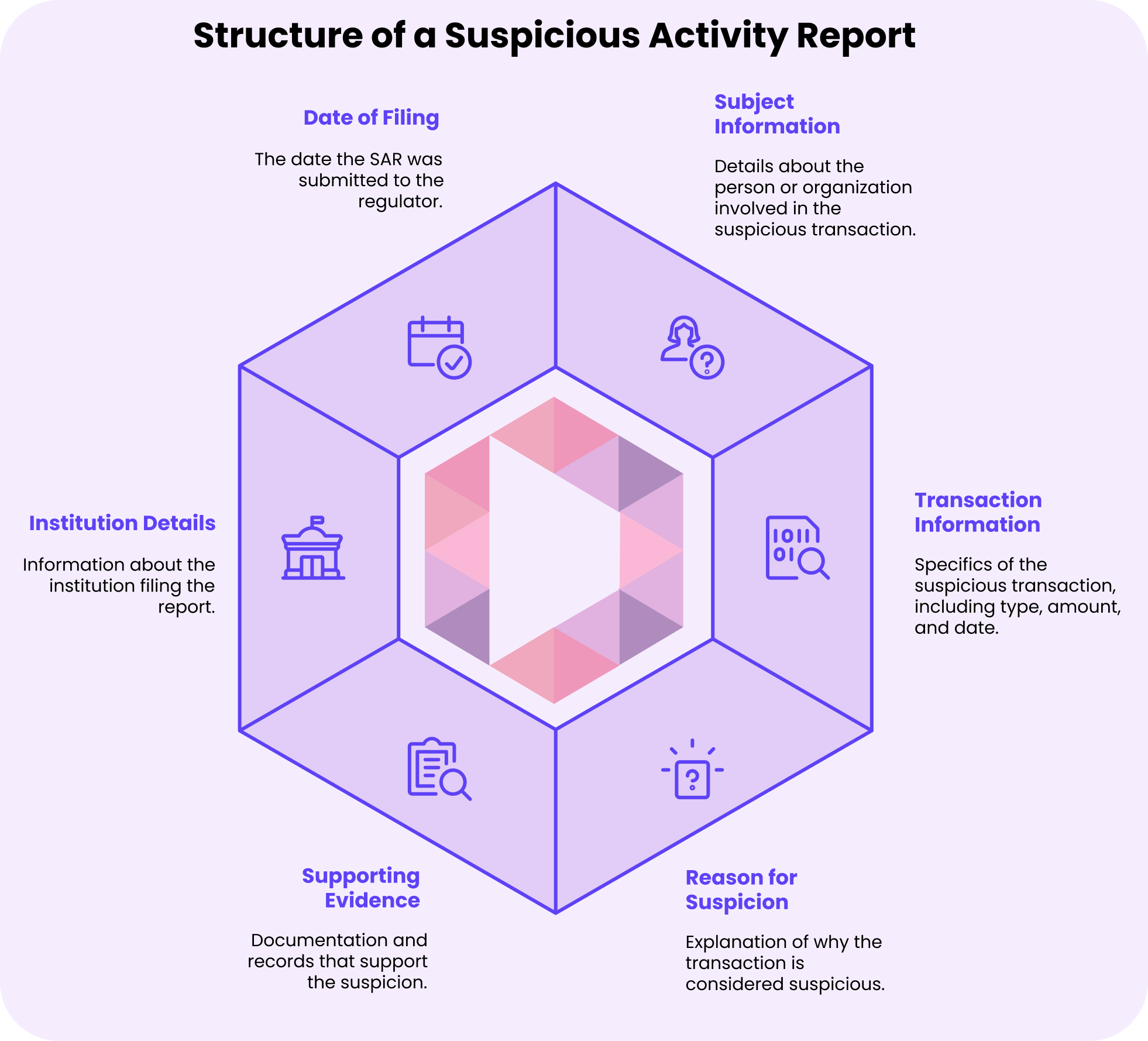A Suspicious Activity Report (SAR) is an important financial sector tool to identify and stop potential fraud, money laundering, and other types of financial crimes. Banks, insurance firms, and money service businesses are mandated to file SARs when they have identified transactions that seem suspicious, out of the norm, or possibly connected to illegal sources.
This required reporting vehicle assists regulatory agencies, like the Financial Crimes Enforcement Network (FinCEN), in tracking and investigating suspicious activity to protect the integrity of the financial system. This article will discuss the highlights of SARs, which cover the activities eligible for filing, the filing process, and practices for ensuring quality and timely reports.
What is a Suspicious Activity Report (SAR)?
Suspicious Activity Report is a report that financial institutions and other regulatory institutions are required to submit to financial regulatory institutions to report any such potentially suspicious or fraudulent transactions. SARs are of paramount importance for the purpose of detecting terrorist financing, money laundering, as well as other financial crimes.
Its primary purpose is to alert regulatory bodies like the Financial Crimes Enforcement Network (FinCEN), law enforcement authorities, and financial institutions of suspected money laundering, fraud, or terrorist financing operations.
Key Elements of a SAR

- Subject Information: Information concerning the person or organization that is a party to the suspicious transaction, such as name, address, account numbers, and identification details.
- Transaction Information: Definition of the suspicious transaction, including type, amount, date, and location.
- Reason for Suspicion: Description of why the transaction is suspicious, including unusual account behavior, structuring, or bulk cash deposits.
- Supporting Evidence: Documentation, records, or other evidence that substantiates the suspicion of suspicious activity.
- Institution Details upon Filing: Details about the institution submitting the report, which may include their name, address, and telephone number.
- Date of Filing: The date upon which the SAR was submitted to the concerned regulator.
The Importance of Suspicious Activity Report (SARs) in Financial Crime Prevention
- Role in Detecting Financial Crimes: Suspicious Activity Reports (SARs) are critical in identifying potential financial crimes such as money laundering, fraud, and terrorist financing. They notify banks and regulators about suspicious transactions that could signal illegal transactions.
- Contribution towards Regulatory Compliance: SAR filing is a regulatory mandate under anti-money laundering (AML) and counter-terrorist financing (CTF) legislations. Being compliant with the requirements of filing SARs ensures that financial institutions are not penalized legally as well as damaged reputationally.
- Impact on the Integrity of the Financial System: SARs enhance the integrity of the financial system through improved transparency and the avoidance of financial services misuse. They are a critical element of the financial crime risk management system, supporting early detection of criminal activity.
When to File a Suspicious Activity Report?
- Reporting Suspicious Activity: Institutions are required to report a SAR when they have identified transactions as suspicious, in line with neither the customer profile nor expected normal behavior, or that may be related to money laundering, fraud, or other criminal activity.
- Set Patterns and Thresholds: A SAR is generally required when transactions fit certain criteria, like being greater than a specified amount of money (e.g., $5,000 for banks) or showing patterns of activity typical of illegal activity.
- Legal and Regulatory Timelines: After suspicious activity has been identified, a SAR must be filed within a particular time frame. Financial institutions generally have 30 calendar days from the initial identification to file the report.
How to File a SAR Effectively?

- Gather Pertinent Information:
Secure all pertinent information regarding the suspicious activity, such as information regarding the parties involved, accounts, transactions, and the reason for suspicion.
- Fill out the SAR Form Correctly:
Fill in the Suspicious Activity Report (SAR) form accurately. Make sure that:
- The subject information (name, address, account number) is accurate and complete.
- The narrative section describes the suspicious activity, including the nature, timing, and basis of suspicion, clearly.
- You use plain, concise, and precise language and avoid assumptions or hypothetical statements.
- Submit to Appropriate Authorities:
In the United States, digitally file the SAR with FinCEN’s BSA E-Filing System.
In India, report the SAR to the Financial Intelligence Unit – India (FIU IND) using the reporting platform prescribed.
Comply with local laws and submission procedures to maintain compliance.
- Keep Record-Keeping and Documentation:
Keep a copy of the SAR and any supporting evidence for at least five years (or as local law requires).
Make records secure and ready to access if audited or investigated.
Maintain a record of all SAR reports, with dates and reference numbers.
Legal Obligations and Consequences
- Regulations Regarding SAR Filing: Familiarize yourself with relevant laws like the Bank Secrecy Act (BSA) in the US and the Prevention of Money Laundering Act (PMLA) in India.
- Penalties for Failure to Comply: Not filing SARs may attract hefty fines, legal penalties, and negative publicity.
- Case Studies: Identify cases where banks were severely penalized for SAR filing delays, stressing the need for compliance.
Confidentiality and Ethical Considerations
Ensuring Subject Confidentiality
- Safeguard the identity of individuals involved in Suspicious Activity Reports (SARs) to prevent potential retaliation and maintain legal compliance.
- Limit SAR data access to authorized staff and institute effective data protection policies to ensure against unauthorized release.
- Utilize anonymization methodologies when disclosing SAR information to external parties or to regulatory agencies.
Ethical Implications of Filing SARs
- Balance regulatory requirements and ethical guidelines by ensuring that SAR reports are grounded in objective, factual information and adhere to neither personal prejudices nor emotional judgments.
- Prevent unjustified accusations by carefully confirming suspicious behavior prior to submitting SARs to avoid the possibility of harming innocent parties.
- Ensure that SARs are not employed as a means of discrimination or profiling, following the principles of fairness and neutrality.
Leveraging Technology in SAR Filing
- Use AI and machine learning programs to detect anomalous patterns and mark potential suspicious transactions in real time.
- Integrate automated systems with transaction monitoring platforms to minimize human errors and enhance detection accuracy.
- Create risk-based models that filter high-risk activity first, allowing for more concentrated SAR investigations.
Final Thoughts
Submission of a Suspicious Activity Report (SAR) is not only a regulatory mandate but also a safeguard against financial crimes and ensures the integrity of the financial system. Prompt and correct reporting can assist in the detection of emerging threats, deter criminal activity, and shield institutions from reputational and legal liabilities. By knowing what constitutes suspicious activity and following prescribed guidelines, financial institutions can help the world combat anti-money laundering (AML) and counter-terrorist financing (CTF) effectively while remaining compliant with regulatory requirements.
FAQ
Who is required to file a SAR?
Banks, credit unions, insurance companies, money service businesses, and other financial institutions are required to file SARs when they detect potentially suspicious transactions.
When to file a SAR?
A SAR has to be reported within 30 days of the observation of a suspicious transaction with $5,000 or more, or $2,000 or more for money services businesses.
What information is included in a SAR?
A SAR will generally contain information regarding the transaction, parties, character of the suspicious activity, and supporting documentation.
What are the implications of failing to file a SAR?
Not filing a SAR can lead to serious penalties, such as fines, regulatory actions, and reputational loss to the institution.
How do SARs get submitted?
SARs get submitted electronically using the Financial Crimes Enforcement Network (FinCEN) BSA E-Filing System or other approved platforms.








